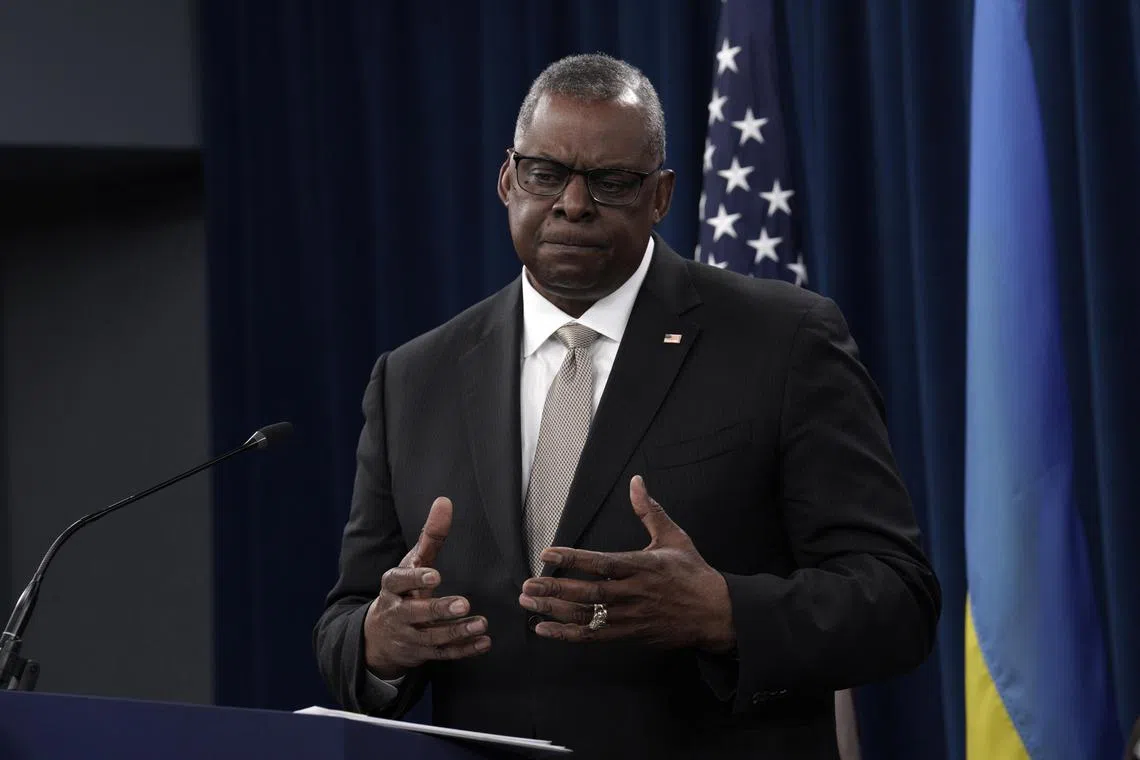US presses China to ease up on Taiwan as defence chiefs meet
Sign up now: Get insights on Asia's fast-moving developments

Defence Secretary Lloyd Austin met with his Chinese counterpart Wei Fenghe in Cambodia, on Nov 22, 2022.
PHOTO: NYTIMES
SIEM REAP – US Secretary of Defence Lloyd Austin urged China to avoid “destabilising actions” towards Taiwan in his first face-to-face meeting with Defence Minister Wei Fenghe since House Speaker Nancy Pelosi’s visit to Taipei in August.
In talks on Tuesday in Siem Reap, Cambodia – on the sidelines of the Asean Defence Ministers’ Meeting – the Pentagon chief also called for the two sides to maintain open lines of communication and warned of “increasingly dangerous behaviour” by Chinese military aircraft in the Indo-Pacific region, according to a statement and briefing by US officials after the talks ended.
Chinese officials called the roughly 90-minute meeting positive, and said they agreed on the need to strengthen crisis management, but put the blame squarely on the United States for deteriorating ties between the world’s two biggest economies.
“The responsibility of the current state of affairs of China-US relations does not lie with China – the main reason is that the US has made the wrong strategic judgment,” Defence Ministry spokesman Tan Kefei told reporters in Cambodia. He said the US should “adopt a rational and practical China policy so as to really remove the root causes of crisis”.
The meeting was the latest effort to put US-China ties on a more stable footing after the first in-person talks between Chinese President Xi Jinping and US President Joe Biden last week in Indonesia.
While the two sides have not resolved deep differences over Taiwan, human rights, US restrictions on tech exports or other issues, they have sought to restore rudimentary links that would keep accidents or disagreements from spinning out of control.
The US has watched with growing concern as China has built up its military into one of the world’s most powerful fighting forces.
Last week, Biden administration officials publicly acknowledged for the first time that China has fielded new, longer-range ballistic missiles on its six nuclear-powered submarines, allowing it to strike the continental US from much closer to its own shores.
Beijing also continues to lay claim to a large swathe of the South China Sea, staking out a position contested by nations from Vietnam to the Philippines.
China’s moves have prompted the US to ramp up efforts to improve outreach in the Indo-Pacific, particularly after Beijing appeared to be making inroads in places such as the Solomon Islands. In a speech in May, Secretary of State Antony Blinken said the US “will shape the strategic environment around Beijing” to advance American interests.
In a more pointed dig at the US last week, Mr Xi said: “The Asia-Pacific is no one’s backyard and should not become an arena for big power contest.”
Ahead of the meeting with Mr Austin on Tuesday, General Wei also condemned American moves to sell arms to Taiwan. China regards Taiwan as a breakaway province awaiting reunification, by force if necessary. Taiwan, however, rejects China’s sovereignty claims.
A US official, briefing reporters after the meeting, said that following Mrs Pelosi’s visit to Taipei, China cancelled a call scheduled between military officials.
Asked if the flurry of recent talks meant that tensions are easing, the official said that “competition” remains the defining feature in the US-China relationship.
The Pentagon statement on Tuesday said the two sides also discussed Russia’s war in Ukraine and reiterated that they “oppose the use of nuclear weapons or threats to use them”.
Mr Austin also criticised recent North Korean missile launches and asked China to fully enforce United Nations Security Council resolutions against Pyongyang’s weapons programme.
The Chinese readout did not mention nuclear weapons, but did say the two sides exchanged views on the South China Sea, Ukraine and the Korean peninsula.
BLOOMBERG


